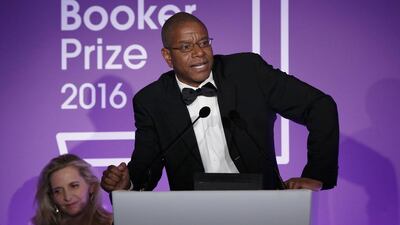There was one quiet but noticeable silver lining in 2016 – a development at odds with war, terror and division and at a remove from insularity, and that was the unprecedented diversity in new books.
Writers from different ethnic backgrounds came to the forefront, some taking away top prizes. Genre and gender were fairly represented. The little-heard voices of outliers and underdogs were welcomed, amplified and acclaimed. Fiction took risks and pushed boundaries. Refreshingly – amazingly – for the first time in a while, there seemed to be something for everyone. Even a Nobel Prize in Literature for a songwriter.
The National Book Award for fiction was won by Colson Whitehead for The Underground Railroad, a novel that was as spellbinding as it was gut-wrenching. Blending far-out inventiveness with harsh historical fact, Whitehead's tale of Cora, a runaway slave in pursuit of freedom, "the greatest currency of all", virtually frazzled the competition and showcased an audacious talent.
One runner-up remained unscorched. Karan Mahajan's quietly explosive The Association of Small Bombs charted the tense build-up to a terrorist attack in Delhi and its devastating aftermath. Paul Beatty became the first American author to win the Man Booker Prize with The Sellout, a wickedly scabrous satire on US race relations.
Deborah Levy's intoxicating Hot Milk, the Booker's second best, dealt with a young woman "stung into desire" while searching for a miracle cure for her mother in Spain. Two other shortlisted titles, neither of which stood a chance, still deserve mention. David Szalay's All That Man Is read more like a collection of short stories, a kind of nine ages of man, but each one delved deep and unearthed a host of beautiful revelations and ugly truths. And Graeme Macrae Burnet's His Bloody Project was an ingenious and gripping account of madness, memoir and "sanguinary deeds" in the Scottish Highlands.
Just as compulsive but even more of a visceral read was Ian McGuire's The North Water, an astonishing novel that laid bare the machinations and "vile urgings" of several crew members onboard an Arctic whaler. Both a nautical whodunit and a thrilling yarn examining levels of endurance and treachery, this book also puts a previously unknown author on the literary map.
Three fascinating biographies celebrated the life and work of three remarkable women of letters. Brendan King's Love by All Sorts of Means explored the inspiration for Beryl Bainbridge's bleakly comic novels, while Ruth Franklin's A Rather Haunted Life got to grips with Shirley Jackson's domestic horror, and Edmund Gordon's The Invention of Angela Carter illuminated an inimitable sorcerer's black magic.
A biography of the elusive Elena Ferrante did not appear, and nor is it likely to. Nonetheless, we got the next best thing with Frantumaglia: A Writer's Journey, a valuable trove of letters, interviews and essays on her craft. Let's just hope that the exposure of her identity this year has not forced her to put down her pen.
Two exemplary authors produced powerful, multi-stranded novels built around separate Asian political upheavals. Han Kang's Human Acts, her follow-up to the bestselling The Vegetarian, focused unsparingly on the fallout from the brutal insurgency in Gwangju, South Korea, in 1980. Madeleine Thien's Do Not Say We Have Nothing tracked three musicians destabilised by China's 20th century convulsions.
Hisham Matar also confronted real-life events in The Return. This, however, was all hard fact, devoid of any fictional trappings. Complex, harrowing, yet utterly rewarding, Matar's memoir described his search for his "disappeared" father, last heard of in Gaddafi's notorious Abu Salim prison in 1990. This magisterial book was fuelled by righteous anger but infused with intelligence, warmth and humanity.
Finally, 2016 saw some of the old guard performing new tricks. Ian McEwan was in a playful mode with Nutshell, his Hamlet-flavoured novel narrated by an erudite foetus. Sebastian Barry's Days Without End dexterously flitted between love and war, violence and beauty, and marked a career-high. Edna O'Brien's chilling study of evil, The Little Red Chairs, was proof that a class act isn't withered by age, it just gets classier. And in Ninety-Nine Stories of God, a fantastical assortment of flash fiction ranging from zesty short stories to pithy aphorisms, Joy Williams revealed she is still sitting atop her own cloud in her own universe.
A year dominated by lows, not highs, of leaps into the unknown and backward steps. How reassuring then, in this post-truth world, in uncertain times, that we can find solace, stability and enlightenment from books of many colours.
Malcolm Forbes is a freelance reviewer based in Edinburgh.

